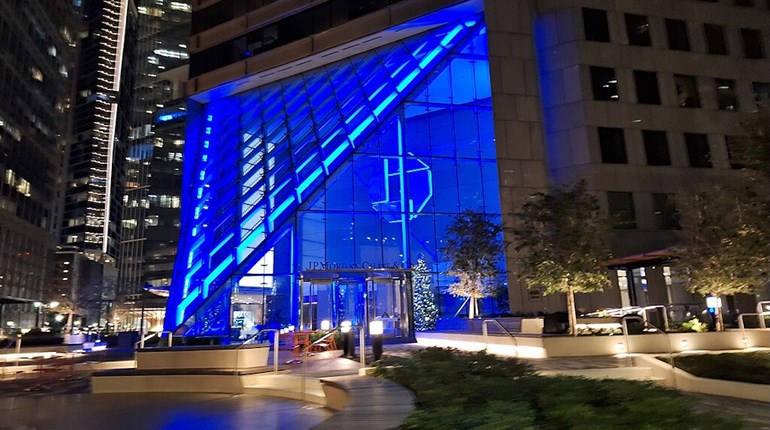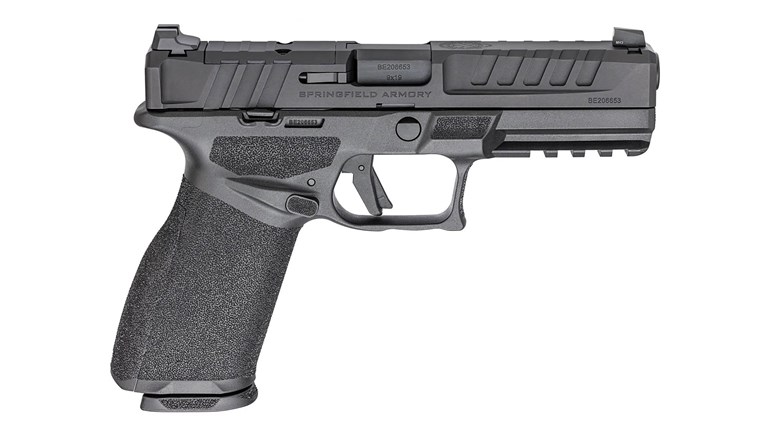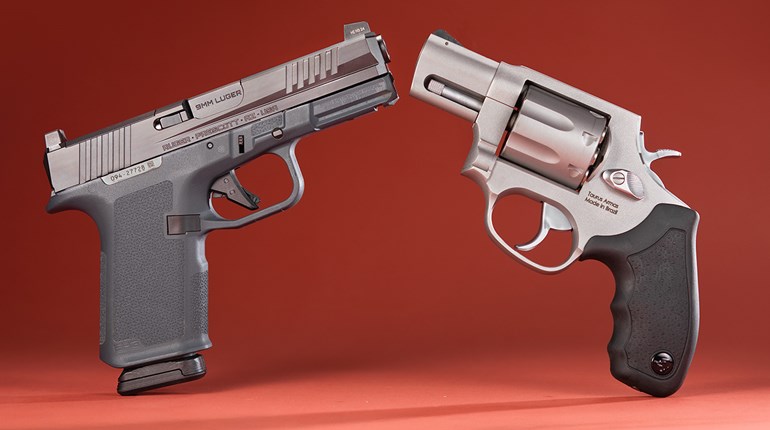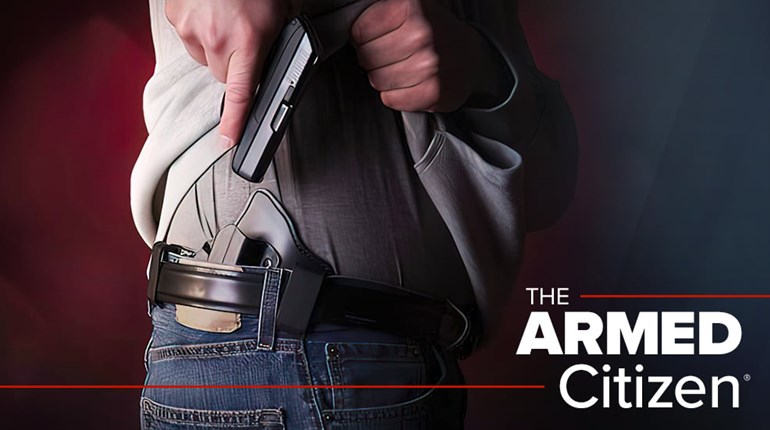
Robin Evans, founder and owner of Chicks with Triggers LLC and an NRA-certified firearms instructor located in South Carolina, says her mission is to help women “become their own first responders.” Still, when she founded Chicks with Triggers in 2020, she didn’t expect her business to grow so fast that she would have a difficult time keeping up.
“The need for quality gun trainers in my community is just so profound. I mean, I don’t even advertise. I just use social media and word of mouth to get new clients,” she said.
But then, she is being humble.
As you’ll see, Evans has carefully crafted a unique and embracing ethos to create classes—including online classes—that quickly make her clients (who are mostly women) feel safe and empowered. Since 2020, she has taught over 4,500 women to carry, handle and shoot firearms. Her positive impact is still growing.

A1F: How did you get started? Were you an NRA-certified instructor before you launched Chicks with Triggers?
Evans: So, I became an NRA instructor when I decided to start Chicks with Triggers. In the state of South Carolina, in order to teach, you have to be an NRA-certified instructor. So that was really my first introduction. Before then, everything I learned came from my father, who spent his career as an officer with the New York City Police Department. When I started Chicks with Triggers, it was just, you know, an idea to get women into shooting, to get women into learning how to defend themselves. From there, it really morphed into a domestic-violence advocacy group, because so many different victims started coming to me, started telling me about their stories.
So yeah, I never planned for it to morph into this, but that’s where we are now.
A1F: I love that your website says, “Ladies, the days of waiting for men to protect us are over. We are now protecting ourselves.” That’s going straight at it. Are you just teaching women?
Evans: Well, I have men who come every now and then. Some women drag their husbands along.
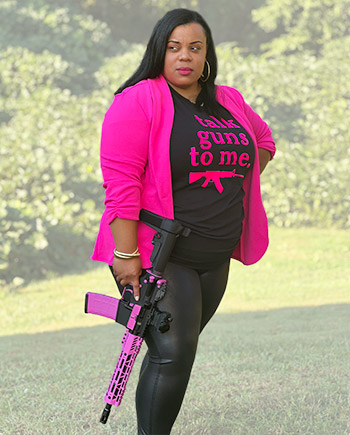 I don’t allow people to just walk in. I have to vet everyone who comes through the door. They go to my website and they fill out an inquiry form. Then I do a little bit of background research on the person. And then, I actually reach out to them. I speak with them, and I want to know, why do they want a gun? What’s their interest in this? Do they have a background in firearms? Is there any type of domestic-violence situation that I need to know about? I need to know if they are in a situation that might put the rest of the group in danger.
I don’t allow people to just walk in. I have to vet everyone who comes through the door. They go to my website and they fill out an inquiry form. Then I do a little bit of background research on the person. And then, I actually reach out to them. I speak with them, and I want to know, why do they want a gun? What’s their interest in this? Do they have a background in firearms? Is there any type of domestic-violence situation that I need to know about? I need to know if they are in a situation that might put the rest of the group in danger.
Before someone comes to my class, I need to be aware of things like that because I have women who have stalkers and stuff like that.
A1F: Are you tailoring these groups to make certain they will all get along?
Evans: Absolutely. I call it the vibe check. I make sure that everyone walking through that door has already passed my vibe check. There are some people who I have to turn down. I try to keep my classes as a safe space for women.
A1F: Let’s say a woman calls you and she says, “I don’t own a gun. I’ve never shot a gun, but I’m in a dangerous situation.” Other than making sure she is getting the help she needs, what is your process?
Evans: We’d do one-on-one instruction in that situation. But, in most cases, we meet for classroom-style instruction before we go to the range. Once we get to the range, I provide everything that we need for every single class. I provide the guns, the ammo, the targets, everything.
I always start them off—especially people who have never shot before—with handguns chambered in .22 LR. I never want to just throw them out there and, you know, give them a 9 mm that they’re not ready for.
We do baby steps and work our way up so they’re comfortable.
A1F: So, you’re bringing your own guns to the range for them to try. Are they all semi-automatic? What are you bringing?
Evans: I have revolvers as well because semi-automatics don’t work for everyone. I bring a range of different calibers and models. I also offer a service called “Try Before You Buy.” I never want people to waste their money on a gun they are not comfortable with. So, when a woman is ready to buy a gun, and they have completed the basic-pistol course, I bring 8 to 10 of the most-common concealed-carry guns for them to try. And it’s a one-on-one session. We shoot every single one until they figure out what they’re comfortable with. I always tell the women that I train, they can’t be scared of the gun and scared of the person trying to attack you. They need to be comfortable with what they’re carrying.
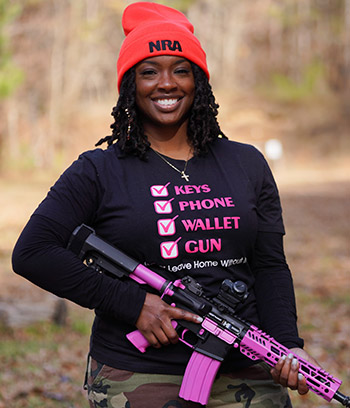 A1F: What about the gun store? Do you have a Federal Firearms License (FFL), or do you recommend a certain gun store in your area?
A1F: What about the gun store? Do you have a Federal Firearms License (FFL), or do you recommend a certain gun store in your area?
Evans: Yeah, I’m in the process of getting an FFL. I do have local places that I will push clients toward, but sometimes they’re not comfortable enough to go in there and buy the gun. So, we do that together. I walk in there with them. I go through the process with them.
A1F: You even go to the gun store with them if they need help! I wouldn’t imagine that most gun stores have women behind the counter.
Evans: Most of them do not have a woman behind the counter or someone who knows how to speak to women. I’ve had some clients tell me they’ve gone to a gun store and had some guy “mansplain” to them about how they should buy some gun they really don’t want. The thing is, a lot of these women, especially the ones that come from domestic-violence situations and backgrounds, are intimidated already. So, I help them. After I introduce them on the range to an assortment of guns, they know they want the Glock 43 or the SIG P365 or whatever fits them best. They are confident because we’ve already gone through this process. So yes, if they need me to go with them, I go with them.
A1F: What else do you do to help your clients become safe and responsible gun owners?
Evans: So, in my academy, we do all kinds of programs. I do a basic-pistol program. I actually do a program called “Learn Your Gun” for women once they actually buy a gun. It’s a four-week program and it’s one-on-one. We learn how to take the gun apart. We learn how to put it back together. We learn how to deal with all malfunctions. If it jams, how are we going to fix it? We go to the range and we shoot and we work on accuracy and sight alignment and trigger control.
I also do holster and carry classes. So, for women who have a gun and a holster, we take it to the next step. We then have to figure out where they’re going to wear this holster.
A1F: How are the men in their lives taking this?
Evans: Most of the men are supportive and some men will send their wives to class with range bags packed. Like you pack a lunch bag for a child, they pack everything in there and they’re so excited that their wife is taking on this responsibility.
But then I have some men who absolutely hate it, because they’re used to abusing these women and they don’t want them to be empowered.
I love telling everyone: “Guns are for girls. That’s why gun starts with a G.”
I’ll often have a mother come to me. And then next, you know, all of her daughters and her sisters will come. I’ve had grandmothers come to my classes. I’ve had groups of women come. They all want to learn how to protect themselves.
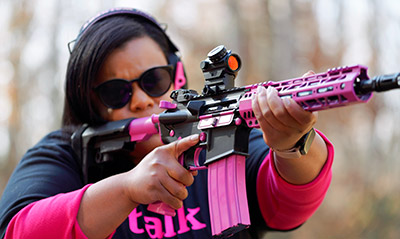 A1F: Now, I don’t want to bring politics into this, but then the U.S. Bill of Rights should be above politics, so I’m wondering, are you seeing any change in the politics of your clients with regard to this issue?
A1F: Now, I don’t want to bring politics into this, but then the U.S. Bill of Rights should be above politics, so I’m wondering, are you seeing any change in the politics of your clients with regard to this issue?
Evans: Absolutely. I think a lot of them, especially the ones that I teach online, are starting to realize they need to change the way they vote, because the government where they live is preventing them from protecting themselves. I think now it’s starting to sink in that if they vote a different way, they might get more freedom to protect themselves.
I feel bad for the people in states like New Jersey, New York and California, because in order to get a permit, they have to go through hell and high water. Things need to change because the violence is not going to change. Women have to be able to defend themselves against all of the people that the system keeps letting loose.
A1F: Another thing I want to ask you about is your lovely pink AR.
Evans: So, my pink AR is my baby. When I started Chicks with Triggers, I realized that a lot of the women—when they come in and they see the black guns—are intimidated. I started paying attention to the bags they were bringing and the designer things they were wearing. It then occurred to me to make the guns match their apparel. And that was a complete game-changer. I added color to the guns. I made them designer guns. And, all of a sudden, the fear just started going away. I always say that when you are terrified about something, you can’t learn about it effectively. But, once I took that fear away, they began to learn better.

A1F: Are these aftermarket grips and stuff that you’re attaching or … ?
Evans: I get them Cerakoted. There is a guy locally. I come up with designs and colors and things like that and he does it for me.
A1F: Wow, gun manufacturers, listen up. They should be talking to you. Why not customize popular models to meet the new consumers?
Evans: Exactly. I’m here to help.
A1F: When speaking with NRA-certified instructors like yourself, I see things opening up as so many more people embrace their freedom. It has to feel so good and worthwhile to be a part of helping so many.
Evans: A lot of women come to me because someone is actively trying to harm them, and a restraining order isn’t working. I would say more than 60% of the women I have taught have, or have had, some type of domestic-violence situation. A lot of the outlets that are designed to help domestic-
violence victims offer shelter and legal protections, but I’m taking it to a different level. I teach them how to defend themselves as they wait for the police to arrive. That does feel worthwhile.
A1F: Where can people find you or contact you?
Evans: ChickswithTriggers.com is my website. Also, all of my social media is Chicks with Triggers. People can find me and can fill out an inquiry form. From there we’ll talk about what’s going on. I offer online classes for everyone. If you don’t live in South Carolina, North Carolina or Georgia, there are still ways I can help.












